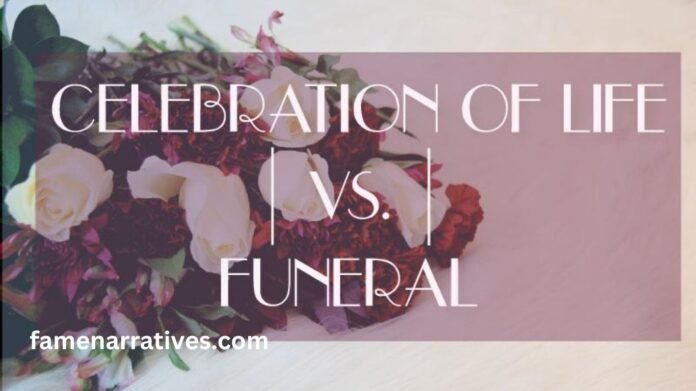Introduction
When facing the loss of a loved one, families often grapple with the decision of how best to honor their memory. Two prevalent options are a celebration of life and a funeral. Understanding the difference between celebration of life and funeral is crucial in making an informed choice that aligns with the deceased’s wishes and the family’s needs.
A funeral is a traditional ceremony, typically held shortly after death, often with the body present. It follows established rituals and is usually conducted in religious or formal settings. In contrast, a memorial service focuses on commemorating the individual’s life, achievements, and personality, often in a more informal and personalized manner. This type of event can occur days or even weeks after the passing, allowing for greater flexibility in planning.
Table of Contents
What Is the Difference Between a Celebration of Life and a Funeral?
The difference between celebration of life and funeral lies primarily in their tone and structure. A funeral is generally solemn, structured, and rooted in religious or cultural traditions. It often includes readings, hymns, and eulogies, providing a space for mourning and reflection. On the other hand, a celebration of life is more uplifting and personalized, focusing on the joy and impact the individual brought to others.
In a funeral, the body is usually present, and the ceremony follows a specific order of service. Conversely, a celebration of life may or may not include the body or ashes and often incorporates personal stories, favorite music, and unique tributes. Understanding what is a celebration of life service helps families choose the most fitting tribute for their loved one.
Celebration of Life vs Funeral: Which Is Right for Your Loved One?
Deciding between a funeral and a memorial service depends on various factors, including the deceased’s wishes, family traditions, and cultural or religious beliefs. A funeral service explanation involves a formal ceremony with specific rituals, often rooted in religious practices. On the other hand, planning a celebration of life event allows for a more personalized approach, focusing on the individual’s life story and passions.
When considering end-of-life service options, it’s essential to reflect on what would best honor your loved one’s memory. Some families opt for a traditional funeral, while others prefer the flexibility and personalization of a celebration of life. In some cases, families choose to have both, providing a formal farewell followed by a more informal gathering.
How Traditions Differ: Celebration of Life Compared to a Funeral
Traditional funeral customs often involve specific rituals, such as a wake, religious service, and burial or cremation. These ceremonies are typically held in places of worship or funeral homes and follow a set structure. In contrast, celebrating a life well lived through a memorial service vs funeral allows for more creativity and personalization, often taking place in unique venues like parks, beaches, or family homes.
The emotional tone of a funeral vs celebration of life also differs. Funerals tend to be somber and reflective, focusing on mourning the loss. Celebrations of life, however, emphasize joy and remembrance, highlighting the positive impact the individual had on others. This shift in tone reflects a broader trend toward modern funeral alternatives that prioritize personalization and celebration.
Key Elements of a Celebration of Life Ceremony
A memorial service often includes storytelling, music, and activities that reflect the deceased’s interests and personality. Unlike traditional funerals, these events may feature photo displays, favorite songs, or even themed decorations. The goal is to create a personalized memorial service that honors the individual’s unique journey.
When planning a celebration of life, consider incorporating elements that were meaningful to your loved one. This could include serving their favorite foods, sharing anecdotes, or organizing activities they enjoyed. Such personalization helps attendees connect with the individual’s legacy and provides comfort during the grieving process.
Traditional Funeral Services: What to Expect
A funeral service typically follows a structured format, including a viewing or visitation, a formal ceremony, and a burial or cremation. These services often involve religious or cultural rituals and are held in designated venues like churches or funeral homes. Understanding the structure of a funeral ceremony can help families prepare for the event.
Attendees of a funeral are expected to dress formally and participate in the prescribed rituals. The ceremony focuses on mourning the loss and offering support to the bereaved. While traditional funerals provide a sense of closure, some families seek non-religious funeral alternatives that align more closely with their beliefs and the deceased’s wishes.
Why More Families Are Choosing Celebrations of Life Over Funerals
In recent years, there’s been a noticeable shift toward alternative to traditional funeral services. Families are increasingly opting for celebrations of life to honor their loved ones in a more personalized and meaningful way. This trend reflects a desire to focus on the individual’s life and legacy rather than solely on their passing.
Factors contributing to this shift include changing cultural attitudes, a decline in religious affiliation, and a growing emphasis on personalization. Modern approaches to death ceremonies prioritize flexibility and individuality, allowing families to create unique tributes that resonate with their values and the deceased’s personality.
Pros and Cons: Funeral vs Celebration of Life
| Aspect | Funeral | Celebration of Life |
| Formality | Formal and structured | Informal and flexible |
| Timing | Held soon after death | Can be scheduled later |
| Tone | Somber and reflective | Uplifting and celebratory |
| Venue | Traditional settings (church, funeral home) | Varied locations (parks, homes, etc.) |
| Personalization | Limited | High |
| Religious Elements | Often included | Optional |
| Cost | Can be higher | Potentially lower |
This comparison helps families compare celebration of life and funeral options to determine the best fit for their needs and preferences.
Is a Celebration of Life Less Formal Than a Funeral?
Yes, a celebration of life is generally less formal than a traditional funeral. These events often forgo strict protocols and allow for a more relaxed atmosphere. Attendees may dress casually, and the setting can be more intimate and personal.
The informal memorial service nature of a celebration of life encourages open sharing of memories and stories, fostering a sense of community and connection. This approach can be particularly comforting for those seeking a more personalized and less rigid way to honor their loved one.
Can You Have Both a Funeral and a Celebration of Life?
Absolutely. Many families choose to hold both a funeral and a celebration of life to meet different needs and preferences. The funeral provides a formal setting for mourning and closure, while the memorial service offers an opportunity to reflect on and celebrate the individual’s life.
This dual approach allows for a comprehensive tribute, accommodating various cultural, religious, and personal considerations. Understanding that you can have a funeral and a memorial service provides flexibility in honoring your loved one in a way that feels most appropriate.
Personalization Differences: Memorial Service vs Funeral vs Celebration of Life
The level of personalization varies among types of memorial services. Traditional funerals often follow established rituals with limited customization. Memorial service vs funeral distinctions include the absence of the body at memorials, allowing for more flexibility in timing and content.
Celebrations of life offer the highest degree of personalization, focusing on the individual’s unique story and preferences. Incorporating elements like favorite music, hobbies, or personal anecdotes makes the event more meaningful. Embracing personalization in memorial services ensures a tribute that truly reflects the person’s life and legacy.
FAQs
1. Is a celebration of life the same as a funeral?
No, a memorial service vs funeral is typically more informal and focuses on honoring the person’s life, while a funeral is often more traditional and somber.
2. What is another name for the celebration of life?
It’s also called a memorial service, life tribute, or remembrance ceremony.
3. What is the etiquette for a celebration of life?
Dress respectfully (often in brighter colors), share memories if invited, and follow any specific wishes of the family.4. How long after a funeral is a celebration of life?
It can take place immediately after, a few days, or even weeks or months later, depending on family preferences.

